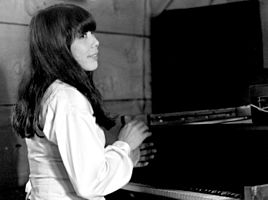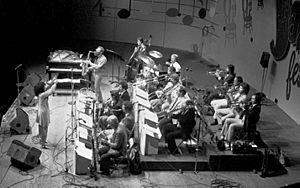Toshiko Akiyoshi facts for kids
Quick facts for kids
Toshiko Akiyoshi
|
|
|---|---|

Toshiko Akiyoshi in 1978
|
|
| Background information | |
| Birth name | Toshiko Akiyoshi (穐吉 敏子, Akiyoshi Toshiko) |
| Also known as | "Toshiko", Toshiko Mariano, 秋吉 敏子 |
| Born | 12 December 1929 Liaoyang, Manchuria, China |
| Origin | Beppu, Japan |
| Genres | Jazz |
| Occupation(s) |
|
| Instruments | Piano |
| Years active | 1946–present |
| Labels | Norgran, Columbia, Victor, RCA Victor, Discomate, Inner City, Nippon Crown |
| Education | Berklee College of Music |
| Signature | |
 |
|
Toshiko Akiyoshi (秋吉敏子 or 穐吉敏子, Akiyoshi Toshiko, born 12 December 1929) is an American jazz pianist. She is also a talented composer, arranger, and bandleader.
Toshiko Akiyoshi has been nominated for Grammy Awards fourteen times. She was the first woman to win awards for Best Arranger and Composer from Down Beat magazine. In 1984, a movie about her life, Jazz Is My Native Language, was released. She wrote her own story, Life with Jazz, in 1996. In 2007, she was honored as an NEA Jazz Master by the U.S. National Endowment for the Arts.
Contents
Toshiko Akiyoshi's Early Life and Music Journey
Toshiko Akiyoshi was born in Liaoyang, Manchuria. Her family was Japanese, and she was the youngest of four sisters. After World War II in 1945, her family lost their home. They moved back to Japan and settled in Beppu.
A local record collector introduced her to jazz music. He played a song called "Sweet Lorraine" by Teddy Wilson. Toshiko loved the sound right away. She then started to learn and play jazz herself.
How Toshiko Was Discovered
In 1953, the famous pianist Oscar Peterson was touring Japan. He found Toshiko playing in a club in Ginza. Peterson was very impressed by her skills. He convinced a record producer named Norman Granz to record her music.
Later in 1953, Toshiko recorded her first album. She played with Peterson's band members: Herb Ellis on guitar, Ray Brown on bass, and J. C. Heard on drums. The album was called Toshiko's Piano in the U.S. and Amazing Toshiko Akiyoshi in Japan.
Studying Jazz in America
Toshiko wanted to learn more about jazz. In 1955, she wrote a letter to Lawrence Berk, who ran the Berklee School of Music in Boston. She asked for a chance to study there. After a year of talks with officials, Berk got permission for her to join. He gave her a full scholarship and a plane ticket to Boston.
In January 1956, Toshiko became the first Japanese student at Berklee. She even appeared on a TV show called What's My Line? in March 1956. Years later, in 1998, Berklee gave her an honorary doctorate degree in music.
Toshiko faced some challenges when she came to America. Some people saw her as unusual because she was a Japanese woman playing jazz. She said that some of her early success was because she was "strange" and new. Even though she was born in Manchuria, Toshiko sees herself as Japanese.
Forming Bands and Making Music
Toshiko Akiyoshi married saxophonist Charlie Mariano in 1959. They had a daughter named Michiru. Toshiko and Charlie formed several bands together. They later divorced in 1967.
In the same year, she met another saxophonist, Lew Tabackin. They married in 1969. In 1972, Toshiko, Lew, and Michiru moved to Los Angeles.
The Toshiko Akiyoshi – Lew Tabackin Big Band
In March 1973, Toshiko and Lew started a 16-person big band. It was made up of professional studio musicians. Toshiko wrote and arranged all the music for the band. Lew was the main soloist, playing tenor saxophone and flute.
Their first album, Kogun, was recorded in 1974. The title means "one-man army." It was inspired by a story of a Japanese soldier who was lost for 30 years. He thought World War II was still happening and stayed loyal to the Emperor. Kogun became very popular in Japan, and the band started to get great reviews.
In 1982, Toshiko and Lew moved to New York City. There, they formed the Toshiko Akiyoshi Jazz Orchestra featuring Lew Tabackin. Toshiko often toured with smaller groups to earn money for her big band. Many of her big band albums were released only in Japan.
The End of the Big Band Era
On December 29, 2003, her big band played its last concert. It was at Birdland in New York City. The band had played there regularly for over seven years. Toshiko explained that she stopped the band because it was hard to get recording deals in the U.S. for big band music.
She also wanted to focus more on her piano playing. She felt that composing and arranging for the big band had taken her away from playing solo piano, which she loved most. On March 24, 2004, Warner Japan released the band's final recording. It was called Last Live in Blue Note Tokyo.
Toshiko Akiyoshi's Unique Music Style
Toshiko Akiyoshi's Japanese background is a big part of her music. It makes her compositions special and different from other jazz artists. After jazz legend Duke Ellington passed away in 1974, a writer named Nat Hentoff said Ellington's music showed his African roots. This inspired Toshiko to explore her own Japanese musical heritage.
She started using Japanese themes, melodies, and even traditional instruments in her jazz. These instruments included the kotsuzumi, kakko, utai, and tsugaru shamisen. However, her music always stayed true to jazz. She was influenced by great jazz musicians like Duke Ellington, Charles Mingus, and Bud Powell.
One reviewer of her album Road Time praised her big band music. They said her compositions were so clever that she was among the top jazz composers. They even compared her to famous names like Duke Ellington and Gil Evans.
The Hiroshima Suite
In 1999, a Buddhist priest named Kyudo Nakagawa asked Toshiko to write a piece for his hometown of Hiroshima. He sent her photos of the city after the nuclear bombing. At first, Toshiko was horrified and didn't know how to compose about such a sad event.
Then, she saw a picture of a young woman coming out of a shelter with a faint smile. Toshiko realized the message was about hope. With this idea, she composed a three-part musical piece called Hiroshima: Rising from the Abyss. It was first performed in Hiroshima on August 6, 2001. This was the 56th anniversary of the bombing. The Hiroshima suite was later released on an album in 2002.
Awards and Honors for Toshiko Akiyoshi
- NEA Jazz Master, 2007
- Jazz Album of the Year: Long Yellow Road, Stereo Review, 1976
- Gold Disk: Insights, Swing Journal
- Silver Disk: Kogun, Salted Gingko Nuts, Four Seasons of Morita Village, Swing Journal
- Special Award: (50th Anniversary Concert in Japan), Swing Journal
- Down Beat magazine Readers' Poll winner:
- Arranger: 1978, 1979, 1980, 1981, 1982, 1989, 1995
- Big Band: 1978, 1979, 1980, 1981, 1982
- Composer: 1980, 1981, 1982, 1986
- Down Beat magazine Critics' Poll winner:
- Jazz Album of the Year: 1978 (Insights)
- Arranger: 1979, 1982, 1990, 1995, 1996
- Big Band: 1979, 1980, 1981, 1982, 1983
- Composer: 1981, 1982
- Grammy Award nominations:
- Best Jazz Instrumental Performance – Big Band: 1976 (Long Yellow Road), 1977 (Road Time), 1978 (Insights), 1979 (Kogun), 1980 (Farewell), 1981 (Tanuki's Night Out), 1984 (Ten Gallon Shuffle), 1985 (March of the Tadpoles), 1992 (Carnegie Hall Concert), 1994 (Desert Lady / Fantasy).
- Best Arrangement on an Instrumental: 1981 (for "A Bit Byas'd"), 1983 (for "Remembering Bud"), 1985 (for "March of the Tadpoles"), 1994 (for "Bebop")
 Order of the Rising Sun, Gold Rays with Rosette, 2004
Order of the Rising Sun, Gold Rays with Rosette, 2004
Discography
- 1954 Toshiko's Piano (Norgran)
- 1956 The Toshiko Trio (Storyville)
- 1956 Toshiko – Her Trio, Her Quartet (Storyville)
- 1957 Toshiko and Leon Sash at Newport (Verve)
- 1957 The Many Sides of Toshiko (Verve)
- 1958 United Notions (MetroJazz)
- 1961 The Toshiko–Mariano Quartet (Candid)
- 1961 Long Yellow Road (Asahi Sonorama)
- 1961 Toshiko Meets Her Old Pals (King)
- 1963 Toshiko–Mariano Quartet (in West Side) (Takt/Nippon Columbia)
- 1963 East and West (RCA Victor)
- 1963 The Country and Western Sound of Jazz Pianos with Steve Kuhn (Dauntless)
- 1963 Miwaku No Jazz (Victor)
- 1964 Toshiko Mariano and her Big Band (Vee-Jay Records)
- 1965 Lullabies for You (Nippon Columbia)
- 1969 Toshiko at Top of the Gate (Nippon Columbia)
- 1970 Toshiko Akiyoshi in Japan (Liberty)
- 1971 Jazz, the Personal Dimension (Victor)
- 1971 Meditation (Dan Records)
- 1971 Sumie (Victor)
- 1971 Solo Piano (RCA Victor)
- 1974 Kogun (RCA)
- 1975 Long Yellow Road (RCA)
- 1976 Road Time (RCA)
- 1976 Insights (RCA)
- 1976 Dedications (Discomate)
- 1977 Dedications II (Discomate)
- 1977 March of the Tadpoles (RCA)
- 1977 Live at Newport '77 (RCA)
- 1977 Live at Newport II (RCA)
- 1978 Salted Gingko Nuts (Ascent)
- 1978 Toshiko Plays Billy Strayhorn (Discomate)
- 1978 Finesse (Concord Jazz)
- 1979 Notorious Tourist from the East (Inner City)
- 1979 Sumi-e (Insights)
- 1980 Farewell (RCA)
- 1981 From Toshiko with Love (Baystate)
- 1982 European Memoirs (Baystate)
- 1983 Toshiko Akiyoshi Trio (Eastworld)
- 1984 Ten Gallon Shuffle (Baystate)
- 1984 Time Stream (Toshiko Akiyoshi Trio album) (Eastworld)
- 1986 Wishing Peace (Ascent)
- 1987 Interlude (Concord Jazz)
- 1990 Four Seasons (Nippon Crown/Ninety-One)
- 1991 Chic Lady (Ninety-One)
- 1991 Live at Birdland (Fresh Sound)
- 1992 Carnegie Hall Concert (Columbia Records)
- 1992 Remembering Bud: Cleopatra's Dream (Evidence)
- 1994 Desert Lady / Fantasy (Columbia)
- 1993 Dig (Ninety-One)
- 1994 Night and Dream (Ninety-One)
- 1995 Yes, I Have No 4 Beat Today (Ninety-One)
- 1994 Toshiko Akiyoshi at Maybeck (Concord Jazz)
- 1996 Four Seasons of Morita Village (Novus)
- 1996 Time Stream: Toshiko Plays Toshiko (Ninety-One)
- 1997 Toshiko Akiyoshi Trio Live at Blue Note Tokyo '97 (Ninety-One)
- 1998 Monopoly Game (Novus)
- 1999 Sketches of Japan (Ninety-One)
- 1999 Tribute to Duke Ellington (Novus)
- 2000 Toshiko Akiyoshi Solo Live at the Kennedy Center (Crown)
- 2001 Hiroshima – Rising from the Abyss (Video Arts)
- 2004 Last Live in Blue Note Tokyo (Warner Music)
- 2004 New York Sketch Book (Ninety-One)
- 2006 Hope (Ninety-One)
- 2006 50th Anniversary Concert in Japan (T-toc Records)
- 2008 Let Freedom Swing with the SWR Big Band (Hänssler)
- 2008 Vintage (Toshiko Akiyoshi and Lew Tabackin album) (T-toc Records)
- 2009 Solo Live 2004 (Live at "Studio F") (Studio Songs)
- 2010 Classic Encounters (Studio Songs)
- 2011 Toshiko Akiyoshi Jazz Orchestra in Shanghai (Pony Canyon)
- 2015 Jazz Conversations (Victor Entertainment)
- 2016 Toshiko Akiyoshi Plays Gershwin's Porgy And Bess (Studio Songs)
- 2017 My Long Yellow Road (Studio Songs)
- 2019 The Eternal Duo! (Sony)
See also
 In Spanish: Toshiko Akiyoshi para niños
In Spanish: Toshiko Akiyoshi para niños
 | Lonnie Johnson |
 | Granville Woods |
 | Lewis Howard Latimer |
 | James West |


